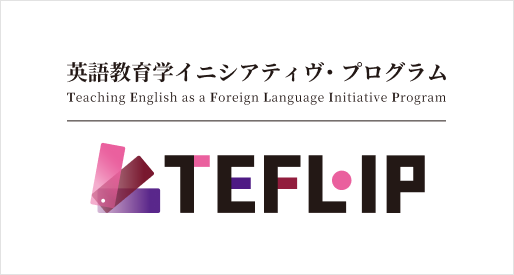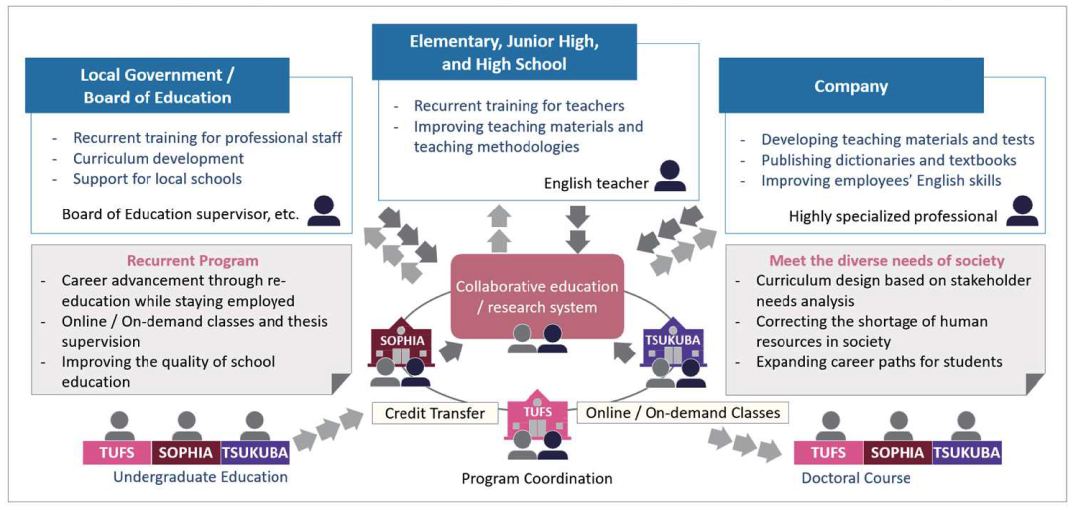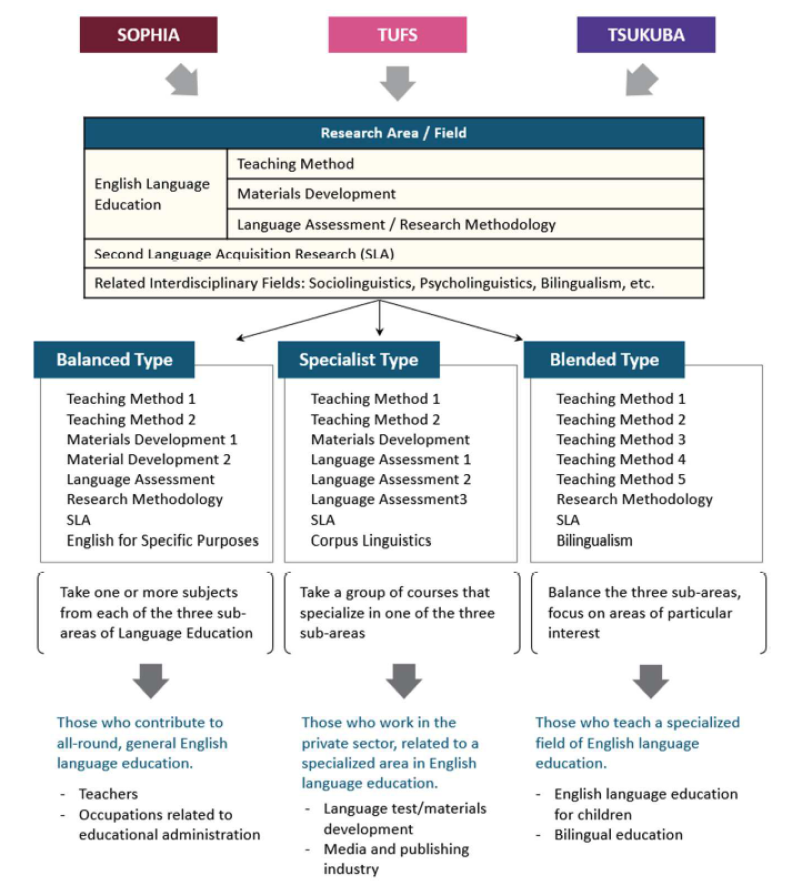Teaching English as a Foreign Language Initiative Program
The TEFL-IP (Teaching English as a Foreign Language Initiative Program) was adopted as a “Graduate
School Networking Project in Humanities and Social Sciences” by MEXT in FY 2023. This project is a
collaboration among three graduate schools with advanced TEFL programs; Tokyo University of Foreign
Studies, University of Tsukuba, and Sophia University. The TEFL-IP offers a joint curriculum in Applied
linguistics, encompassing evidence-based TEFL and related interdisciplinary areas. It is primarily focused
on the master’s program and will be extended to the doctoral program in the future.

- 1. Enhanced Educational Programs: Students can take a wide range of courses from each graduate school
and joint courses (including omnibus lectures by faculty members of the three graduate schools).
Furthermore, the three graduate schools will collaborate in research and thesis supervision through a
team-based educational system that takes advantage of the strengths of each graduate school.rt - 2. Recurrent Education: The program offers numerous options for working professionals, such as
English teachers, local government staff, and private company specialists to obtain a master’s degree
without quitting their jobs. Students can access classes online and learn at their own pace with ondemand
materials. Additionally, online intensive courses are offered during summer and winter
quarters. The curriculum focuses on Project-Based Learning (PBL) style classes, where students will
analyze and solve practical issues in TEFL.t - 3. Enhancement of Opportunities for Internship: Collaboration with various schools, public institutions,
and private companies will be expanded and strengthened to provide a wide range of internship
opportunities that will create new career paths and chances to interact with private and public
organizations related to English language education.t - 4. Pioneering New English Education in the Age of AI: Through classes, students will acquire state-ofthe-
art perspectives tailored to the changing times, and learn how to effectively incorporate
technologies such as Generative AI into English education.
Our program aims to train TEFL professionals who will play an active role in society in improving the English communication skills of Japanese users of English.
Teaching English as a Foreign Language Initiative Program

Integrated Curriculum of Three Universities

List of Courses
| Applied Linguistic Region | List of Courses Provided by the Collaborative Program | |||
| Tokyo University of Foreign Studies | University of Tsukuba | Sophia University | ||
English Language Education | Teaching Method | Evidence-Based TEFL Reading in a Second Language* English Phonetics and Phonology and Teaching Pronunciation* Task-Based Teaching | Teaching and Assessing Interactional Competence* Teaching Writing for Academic Purposes* Implications of Research on the Acquisition of Grammar for CALL Education* Research on the Sentence Processing and Implications for CALL Education* Practical Research Based on CLIL* | Reading and Writing Principles and Practice of CLIL Affective Factors in TESOL Practicum in Teaching English to Young Learners Theories of Teaching English to Young Learners Bilingual Education |
| Materials / Curriculum Development | Principles and Practices in Using the CEFR | Curriculum Development of EOP (English for Occupational Purposes) Program* | Materials Development Curriculum and Syllabus Design | |
| Language Assessment / Research Methodology | Language Testing* Statistical Analyses for ELT* Statistical Analyses for Linguistics with R* Introducing to Rasch Analysis Analytical Methodologies in L2 Vocabulary Research | Theory and Practice of Performance Assessment* Teaching and Assessment of Performance Skills* Introduction to Research Methods in English Language Education* Data Analysis for English Education Research* Qualitative Research* | Action Research Classroom Research Classroom Discourse Analyzing Spoken Data Thesis Writing | |
| Second Language Acquisition Research | Second Language Acquisition Research 1: From Theory to Practice* Second Language Acquisition Research 2: Teaching and Researching L2 Pragmatics* Language Learning Strategies Focus on Form: Theory, Research, and Practice | Research Methods in Vocabulary Learning* Text Comprehension in a Second Language & Development of Biliteracy* Psychology of Language Learning* | Postmodern Approaches to SLA Focus on Form: Theory, Research, and Practice | |
| Related Interdisciplinary Fields | Historical Study of the English Language* English Phonetics and Phonology* English Construction Grammar* | World Englishes Psycholinguistics Sociolinguistics Corpus Linguistics Issues in Linguistic Diversity for the L2 Classroom Intercultural Interaction Language and Power | ||
Courses with an asterisk (*) are delivered in Japanese.













 TESOL (Teaching English to Speakers of Other Languages) Course
TESOL (Teaching English to Speakers of Other Languages) Course
